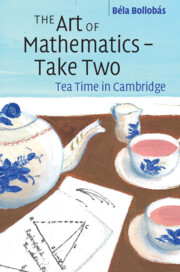
-
Select format
-
- Publisher:
- Cambridge University Press
- Publication date:
- July 2022
- June 2022
- ISBN:
- 9781108973885
- 9781108833271
- 9781108978262
- Dimensions:
- (229 x 152 mm)
- Weight & Pages:
- 0.616kg, 348 Pages
- Dimensions:
- (229 x 152 mm)
- Weight & Pages:
- 0.52kg, 348 Pages
You may already have access via personal or institutional login
Book description
Lovers of mathematics, young and old, professional and amateur, will enjoy this book. It is mathematics with fun: a collection of attractive problems that will delight and test readers. Many of the problems are drawn from the large number that have entertained and challenged students, guests and colleagues over the years during afternoon tea. The problems have their roots in many areas of mathematics. They vary greatly in difficulty: some are very easy, but most are far from trivial, and quite a few rather hard. Many provide substantial and surprising results that form the tip of an iceberg, providing an introduction to an important topic. To enjoy and appreciate the problems, readers should browse the book choosing one that looks particularly enticing, and think about it on and off for a while before resorting to the hint or the solution. Follow threads for an enjoyable and enriching journey through mathematics.
Awards
Winner, 2023 Choice Awards
Reviews
‘The appealing title The Art of Mathematics - Take Two: Tea Time in Cambridge, of the book by Bela Bollobas, will not disappoint the readers. The book's content will transfer the readers back several centuries and offer examples of math problems that trigger the readers' curiosity and excitement to find solutions.’
Andrzej Sokolowski Source: Mathematical Association of America Reviews
‘This is a fun book to have … It deserves a place on your shelf to rescue you from the times you find yourself stuck with the mathematics you're dealing with at work or during your studies. For the reader who has long since finished formal mathematical studies but enjoys jumping back into recreational mathematics, this book will provide a great excuse to go back over old topics, without being a reference book.’
Dominic Thorrington Source: London Mathematical Society Newsletter
‘As implied by the title … the problems posed often arose in the context of a tradition that is well established in many university departments of mathematics, whereby the members of the department gather for afternoon coffee or tea and do what they like to do best: discuss mathematics. Such camaraderie among mathematicians can be felt by readers working through the problem solutions, most of which also include a fascinating account of the history of the particular problem and the mathematicians who were involved in discussing it … Highly recommended.’
D. S. Larson Source: Choice
‘This book would be a great source of problems to talk about at a departmental tea or for a problem-solving seminar … with so many interesting problems and topics, you are bound to have plenty to choose from!'
Katelynn Kochalski Source: Bulletin of the American Mathematical Society
‘Béla Bollobás’s book is the perfect coffee-table book for any maths department’s common room.’
René L. Schilling Source: The Mathematical Gazette
‘A very individual problem book, with a huge range of subject matter and difficulty. There is material here for many purposes, even for enrichment material for advanced sixth formers or undergraduates … there is certainly something here, if not for everyone, then for a wide range of mathematical readers.’
Peter Giblin Source: The Mathematical Gazette
‘... a 'mathematics with fun' book that is meant to be enjoyed … having enjoyable problems with elegant solutions … Many solutions contain biographical notes about the mathematicians involved and a list of appropriate references … There is something for every type of mathematician here …’
Laurence E. Nicholas Source: Mathematics Today
Contents
Metrics
Altmetric attention score
Full text views
Full text views help Loading metrics...
Loading metrics...
* Views captured on Cambridge Core between #date#. This data will be updated every 24 hours.
Usage data cannot currently be displayed.
Accessibility standard: Unknown
Why this information is here
This section outlines the accessibility features of this content - including support for screen readers, full keyboard navigation and high-contrast display options. This may not be relevant for you.
Accessibility Information
Accessibility compliance for the PDF of this book is currently unknown and may be updated in the future.


